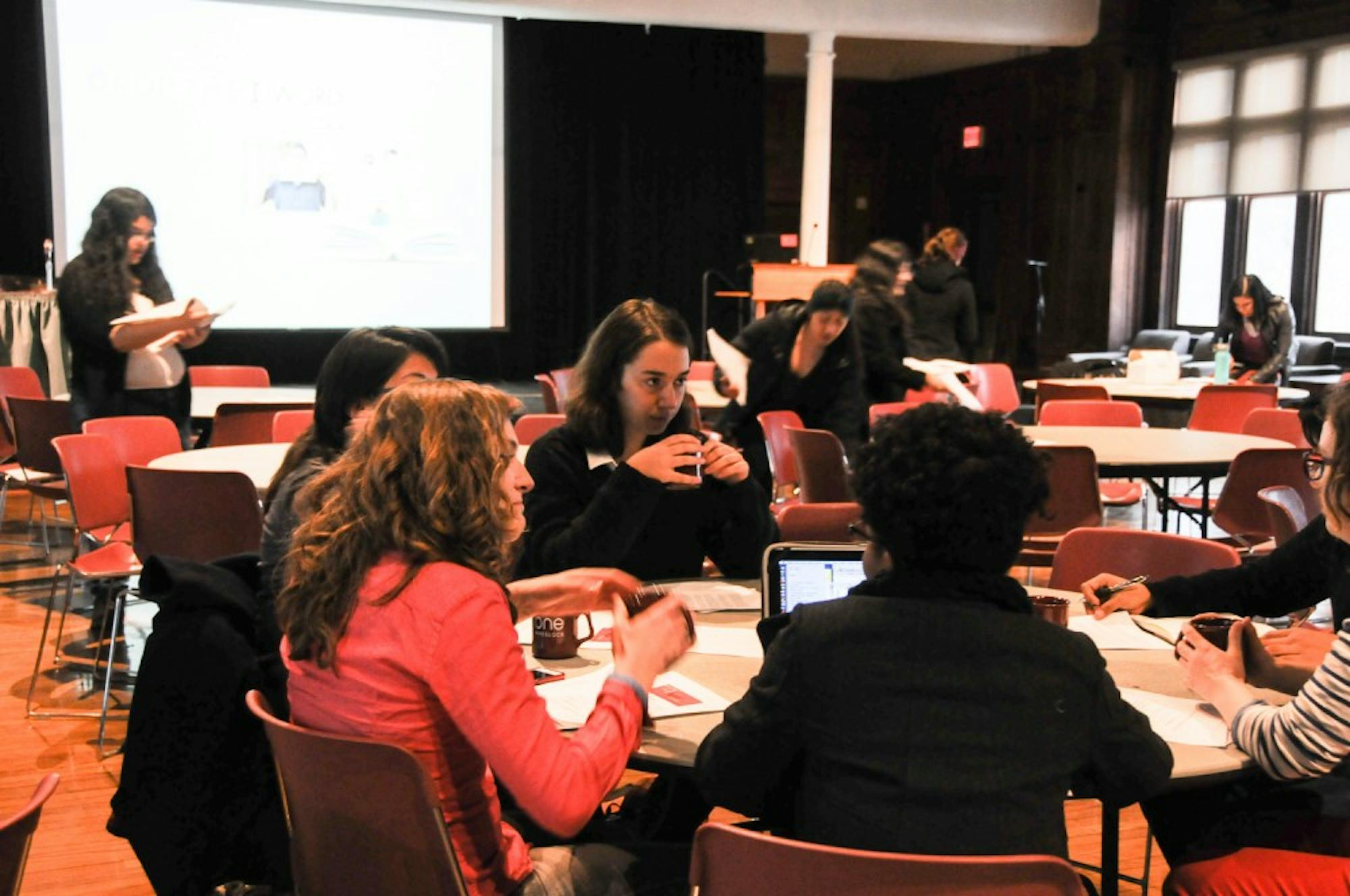A few years after Daniela Pelaez ’16 and her family emigrated from Barranquilla, Colombia, to Florida in 1999, Pelaez’s mother fell seriously ill. Lacking health insurance, her mother decided to return to Colombia after a lawyer told the family that she could return to the U.S. after receiving medical care. This, however, was not the case, and Pelaez’s mother was banned from the U.S. for 10 years.
At a student panel and discussion hosted by Dartmouth Coalition for Immigration Reform, Equality and DREAMers on Monday night, Pelaez said that her mother has missed milestones in her life and will not be able to attend her graduation.
“It’s very unfortunate how immigration laws splinter the family unit,” Pelaez said. “It gets worse when I am being called an illegal alien.”
CoFIRED’s event, titled “Drop the I-Word,” addressed the use of the word “illegal” to refer to undocumented immigrants living in the U.S. Speaking to an audience of over 50 students and other community members in Collis Common Ground, CoFIRED leaders and supporters said they seek to eliminate the use of the word both at the College and nationwide.
“There are undocumented students at Dartmouth,” event facilitator Oscar Cornejo ’17 said. “When we call members of our Dartmouth community illegal, we are dehumanizing and excluding them from our community.”
The night’s program opened with a presentation by Institute for Writing and Rhetoric professor Claudia Anguiano, who is currently conducting research on the undocumented student experience. Anguiano surveyed audience members about what word they would use to “describe someone who has migrated to the United States without formal authorization.”
Answers included “person without papers” and “undocumented immigrant” — alternatives to “illegal alien” that Anguiano said were better words to use.
“We know, from all the research and data that has been done about language, that our social realities are constructed by way of our language,” Anguiano said, adding that the term “illegal” is an “insulting and disparaging word.”
Afterward, three panelists discussed their personal experiences dealing with their own undocumented statuses.
Panelist Melissa Padilla ’16 spoke of entering the U.S. from Mexico.
“When I was born, I was a woman, I was a daughter, I was a sister,” Padilla said. “Then I crossed the border and those things kind of took a back turn — overnight, I became a criminal.”
Padilla added that she still feels the stress of having been an undocumented person, despite having earned citizenship after 18 years of waiting. She reiterated that the word “illegal” criminalizes undocumented people and encumbers them with a painful identity.
The second panelist, a male member of the class of 2014, was born in Mexico. When he was 11, he crossed the border into the U.S. to see his mother, who had previously immigrated to America. He requested anonymity to keep his status private.
“In Mexico, I was just me,” he said. “I came to the United States, and right away I turned into an illegal Mexican. It haunted me because the word implied criminality.”
Additional struggles accompanied his undocumented status, he said, since he could not travel, participate in federal programs or see his family often. He also knew that the college admissions process would prove difficult.
Pelaez said that she related to the male panelist’s experiences.
“Hopefully with this campaign we can drop the I-word and realize that we’re all students,” she said. “We’re just dreamers, like everybody else.”
The term “illegal immigrant” or “illegal alien” has come under fire in recent years for criminalizing people rather than their actions, while others have contended that the term is more accurate than “undocumented,” which some say ignores possible documentation in a person’s country of birth. The Associated Press amended its stylebook to ban use of the term “illegal” to describe a person in April 2013.
Last year, student governments at the University of California at Los Angeles and UC Berkeley passed resolutions banning the term “illegal immigrant” from their discourse.
Founded last fall, Dartmouth’s CoFIRED acts as a support system and advocacy channel for the College’s undocumented students. In addition to CoFIRED, the Office of Visa and Immigration Services provides help to undocumented students via confidential counseling and offering additional resources and information.
After the panel discussion concluded, facilitators urged audience members to sign a “Drop the I-Word” petition directed toward Student Assembly and College administrators.
“Words matter and hurt, and thus we must choose them carefully,” the petition states.
After the panel, audience members formed small groups to discuss their personal reactions to the word “illegal,” its use in the media, what actions Dartmouth could take and whether they believed banning the word was a good idea.
Logan Henderson ’17 said putting student faces to the issue was important and effective.
“It allows us, as Dartmouth students, to relate, because [undocumented] students are our friends,” he said, “and people don’t even know it.”




